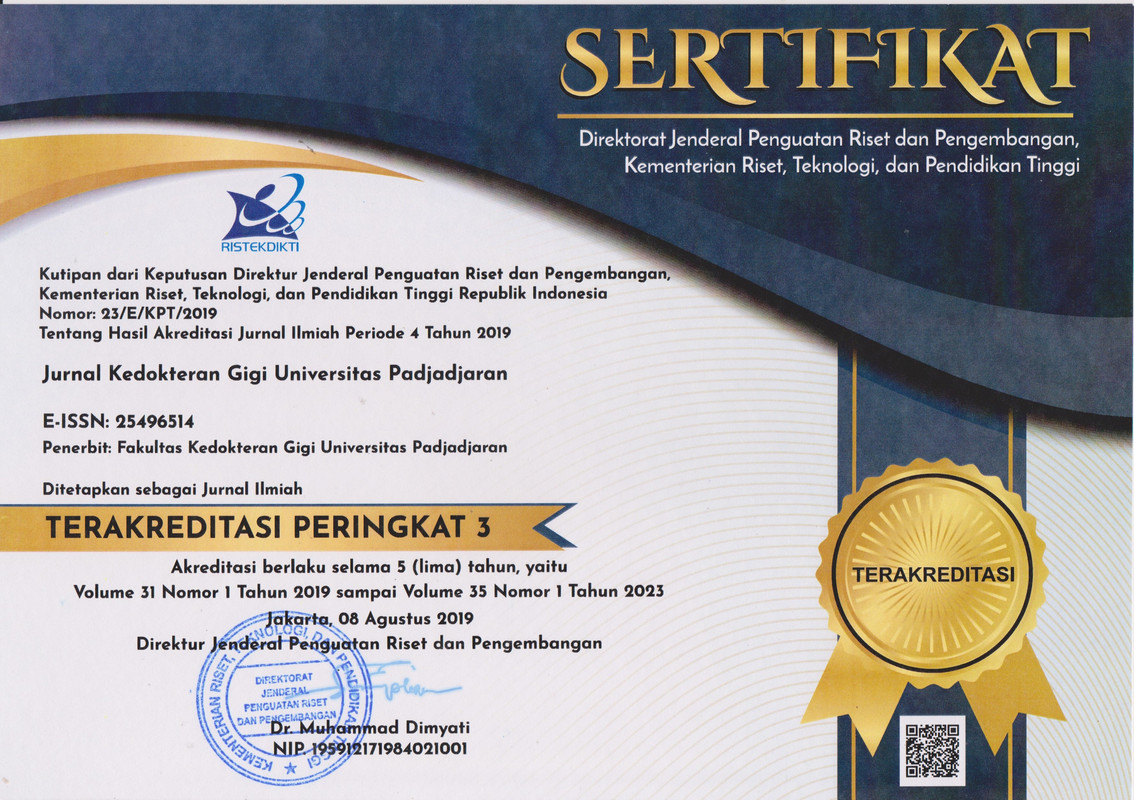Penatalaksanaan restorasi overlay komposit pada gigi molar pertama kiri mandibula pasca perawatan saluran akar
Management of composite overlay restoration of mandibular first molar post-root canal treatmentAbstract
ABSTRAK
Pendahuluan: Proses karies gigi dan gigi yang telah dilakukan perawatan endodontik menyebabkan kehilangan substansi gigi sehingga lebih rentan terhadap fraktur. Frederico Ferraris mengatakan restorasi adhesif indirek posterior umum digunakan pada kasus kavitas dengan kerusakan koronal yang luas. Penggunaan overlay komposit indirek memberikan beberapa keuntungan, termasuk konservatif, sealing, fungsi dan estetik yang baik. Tujuan laporan kasus ini membahas penatalaksanaan restorasi overlay komposit indirek sebagai pilihan restorasi pasca perawatan saluran akar. Laporan kasus: Pasien perempuan berusia 47 tahun datang ke klinik dengan keluhan gigi geraham bawah kiri belakang berlubang dan seringkali terselip makanan sejak 2 minggu yang lalu. Pasien tidak memiliki riwayat nyeri spontan, pernah dilakukan penambalan sebelumnya ± 1 tahun lalu. Pemeriksaan objektif menunjukkan gigi 36 tes vitalitas, tes perkusi dan tes tekan negatif, tidak terdapat kegoyangan gigi dengan jaringan sekitar dalam batas normal. Pemeriksaan radiografis menunjukkan terdapat gambaran radioopak menyerupai tambalan dari enamel hingga kamar pulpa dan mendekati bifurkasi, pelebaran membran periodontal, penebalan lamina dura disertai gambaran radioopak di sekitar apikal akar gigi. Jaringan karies dihilangkan dan pembukaan akses kavitas gigi 36, irigasi dengan NaOCl 5,25% dan agitasi menggunakan Eddy® tip, dan preparasi saluran akar dengan teknik crown down menggunakan nikel titanium rotary Protaper GoldTM dan restorasi follow up overlay komposit indirek. Pemeriksaan radiografis bitewing dilakukan pasca pemasangan overlay komposit indirek untuk mengevaluasi keberhasilan perawatan. Simpulan: Restorasi overlay komposit menunjukkan keberhasilan perawatan restorasi pasca endodontik dengan penyembuhan jaringan periapikal serta respon jaringan yang baik.
Kata kunci: perawatan saluran akar; overlay; komposit indirek
ABSTRACT
Introduction: Dental caries processes and endodontically treated teeth (ETT) cause tooth loss, making it more susceptible to fracture. Frederico Ferraris showed that posterior indirect adhesive restoration (PIAR) is commonly used in cases with widespread coronal damage. The indirect composite overlay restoration provides several advantages, including conservative, sealing, function and pleasing aesthetics. This case report discusses the management of indirect composite overlay restoration as a treatment of restoration for post-root canal treatment. Case report: 47-years-old female patient came to the clinic with complaints of cavities in the left lower molar and food impaction 2 weeks ago. The patient has no history of spontaneous pain and had restoration fillings performed 1 year ago on this tooth. Objective examination showed non-vital teeth 36, percussion test and pressure test were negative, and there was no mobility of teeth with the normal surrounding tissue. Radiographic examination shows radiopaque of the crown from enamel towards the pulp chamber and approaching the bifurcation, widening of periodontal membrane, and thickening of lamina dura, accompanied by a radiopaque appearance around the apical root. Removal of caries tissue and access opening of the cavity was performed, irrigation with 5.25% NaOCl and agitation using an Eddy® tip, and root canal preparation with the crown down technique using nickel-titanium rotary Protaper GoldTM™ and indirect composite overlay restorations as a follow-up. Bitewing radiograph is carried out after cementation of indirect composite overlay to evaluate the success of dental treatment. Conclusion: The indirect composite overlay adhesive restoration showed success in restoration post endodontic treatment with the healing of periapical tissue and good tissue response.
Keywords: root canal treatment; overlay; indirect composite
Keywords
Full Text:
PDFReferences
DAFTAR PUSTAKA
Veneziani M. Posterior indirect adhesive restorations: updated indications and the morphology driven preparation technique. Int J Est Dent. 2017; 12(2): 2-28.
Torres CR, Zanatta RF, Huhtala MF, Borges AB. Semidirect posterior composite restorations with a flexible die technique. J Am Dent Assoc. 2017; 148(9): 671-6. DOI: 10.1016/j.adaj.2017.02.032.
Santosh SS, Ballal S, Natanasabapathy V. Influence of minimally invasive access cavity designs on the fracture resistance of endodontically treated mandibular molars subjected to thermocycling and dynamic loading. J Endod. 2021; 47(9): 1496-500. DOI: https://doi.org/10.1016/ j.joen.2021.06.020.
Shah EH, Shetty P, Aggarwal S, Sawant S, Shinde R, Bhol R. Effect of fibre-reinforced composite as a post-obturation restorative material on fracture resistance of endodontically treated teeth: a systematic review. Saud Dent J 2021;33: 363-369. DOI: 10.1016/j.sdentj.2021.07.006
De Kuijper MCFM, Cune MS, Özcan M, Gresnigt MMM. Clinical performance of direct composite resin versus indirect restorations on endodontically treated posterior teeth: a systematic review and meta-analysis. J Prosthet Dent. 2021; DOI: 10.1016/j.prosdent.2021.11.009
Guo Yi-Bai, Wei B, Yu-Hong L. Fracture resistance of endodontically treated teeth with cervical defects using different restorative treatments. J Dent Sci. 2022; 17: 842-7. DOI: 10.1016/j.jds.2021.09.017
Corsentino G, Pedullà E, Castelli L, Liguori M, Spicciarelli V, Martignoni M, Ferrari M, Grandini S, et al. Influence of access cavity preparation and remaining tooth substance on fracture strength of endodontically treated teeth. J Endod. 2018; 44(9): 1416-21. DOI: 10.1016/j.joen.2018.05.012.
Shabbir J, Zehra T, Najmi N, Hasan A, Naz M, Piasecki L, Azim AA, et al. Access cavity preparations: classification and literature review of traditional and minimally invasive endodontic access cavity designs. J Endod. 2021; 47(8): 1229-44. DOI: 10.1016/ j.joen.2021.05.007
Peng W, Zhou X, Gao Y, Xu X. Effect of access cavity preparation on dentin preservation, biomechanical property, and instrumentation efficacy: a micro-computed tomographic study. JOE 2022;48(5): 659-668. DOI: 10.1016/ j.joen.2021.12.012
Magaravalli SR, Patel SJ, Rangaswamy P, Ramachandra S, Govindappa K, Hiremath V. Effect of Smart Dentin Replacement, Biodentine, and Its Combination for Dentin Replacement as Alternatives to Full-crown Coverage for Endodontically Treated Molars: An In Vitro Study. J Int Soc Prev Community Dent. 2019; 9(6): 559-65. DOI: 10.4103/jispcd.JISPCD_336_19.
Josic U, Sebold M, Lins RBE, Savovic J, Mazzitelli C, Maravic T, Mazzoni A, Breschi L, et al. Does immediate dentin sealing influence postoperative sensitivity in teeth restored with indirect restorations? A systematic review and meta-analysis. J Esthet Restor Dent. 2022; 34:55-64. DOI: 10.1111/jerd.12841
Kassis C, Khoury P, Mehanna CZ, Baba NZ, Bou Chebel F, Daou M, Hardan L, et al. Effect of inlays, onlays, and endocrown cavity design preparation on fracture resistance and fracture mode of endodontically treated teeth: an in vitro study. J Prosthodont. 2020; 30(7): 625-31. DOI: 10.1111/jopr.13294
Glickman G, Schweitzer Jordan L. Endodontics: colleagues for excellence. American Association of Endodontists. 2013. p.1-6f.
Soares CJ, Rodrigues MP, Faria-E-Silva AL, Santos-Filho PC, Verissimo C, Kim Hyeon-C, Versluis A. How biomechanics can affect the endodontic treated teeth and their restorative procedure. Braz. Oral Res. 2018;32(suppl): e76. DOI: 10.1590/1807-3107bor-2018.vol32.0076
Bainy PT, Malera R, Junior LH, Fontoura de Melo TA. Effect of glass fiber on the restorative procedure in relation to fracture strength of endodontically treated molars. Giornale Italiano di Endodonzia. 2021; 35(1): 178-6. DOI: 10.32067/GIE.2021.35.01.24
Raina A, Sawhny A, Paul S, Nandamuri S. Comparative evaluation of the bond strength of self-adhering and bulk-fill flowable composites to MTA Plus, Dycal, Biodentine, and TheraCal: an in vitro study. Restor Dent Endod. 2020; 45(1): e10. DOI: 10.5395/rde.2020.45.e10.
Magaravalli SR, Patel SJ, Rangaswamy P, Ramachandra S, Govindappa K, Hiremath V. Effect of Smart Dentin Replacement, Biodentine, and Its Combination for Dentin Replacement as Alternatives to Full-crown Coverage for Endodontically Treated Molars: An In Vitro Study. J Int Soc Prev Community Dent. 2019; 9(6) :559-5. DOI: 10.4103/jispcd.JISPCD_336_19.
Buczko Piotr MD, Wawrzyn Sobezak Katarzyna MD, Matuszezak Ewa MD PhD, Hermanowicz Adam MD Phd. The evaluation of Smart Dentin Replacement (SDR), a year observation study. J Educat HealSport. 2018; 8(3): 140-8. DOI: 10.5281/zenodo.1188955
Ferraris F. Posterior indirect adhesive restorations (PIAR): preparation designs and adhesthetics clinical protocol. Int J Esthet Dent. 2017; 12(4): 482-502.
Awwad-Abu M. A modern guide in the management of endodontically treated posterior teeth. Europ J Gen Dent. 2019: 8(3): 63-70. DOI: 10.4103/ejgd.ejgd_76_19
Dhoum S, Jabrane K, Dhaimy S, Talache N, Lahlou K, Ouazzani AE, et al. Indirect posterior restoration: composite inlays. Biomed J Sci & Tech Res. 2018; 5(1): 4312-6. DOI: 10.26717/BJSTR.2018.05.001147
McCarthy R. The application of indirect composite onlays in the restoration of severely broken down posterior teeth. J Ir Dent Assoc. 2015; 61(6): 309-12.
Berman Louis H, Hargreaves Kenneth M. Cohen’s pathways of the pulp. 12th ed. St. Louis: Mosby; 2021. p 529–55
DOI: https://doi.org/10.24198/jkg.v34i2.28358
Refbacks
- There are currently no refbacks.
Copyright (c) 2022 Jurnal Kedokteran Gigi Universitas Padjadjaran
INDEXING & PARTNERSHIP

Jurnal Kedokteran Gigi Universitas Padjadjaran dilisensikan di bawah Creative Commons Attribution 4.0 International License






.png)

















